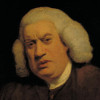“ Man possesses reason, that is to say, he has a class of ideas of which the brutes are not capable, abstract ideas as distinguished from those ideas of perception from which the former kind are yet derived. The consequence is, that the brute neither speaks nor laughs, and lacks all those qualities which make human life great. ”
Arthur Schopenhauer, The World as Will and Representation (1819). copy citation
| Author | Arthur Schopenhauer |
|---|---|
| Source | The World as Will and Representation |
| Topic | perception quality |
| Date | 1819 |
| Language | English |
| Reference | |
| Note | Translated by R. B. Haldane and J. Kemp |
| Weblink | http://www.gutenberg.org/files/40868/40868-h/40868-h.html |
Context
“of the Critique of Pure Reason, the gist of the objection being that the so-called subjective succession is as much objective in reality as what is called objective by Kant: “Phenomena may well follow one another, without following from one another.”
[pg 483]
Chapter V. The fifth chapter commences with an examination of the distinction between man and the brutes. Man possesses reason, that is to say, he has a class of ideas of which the brutes are not capable, abstract ideas as distinguished from those ideas of perception from which the former kind are yet derived. The consequence is, that the brute neither speaks nor laughs, and lacks all those qualities which make human life great. The nature of motives, too, is different where abstract ideas are possible. No doubt the actions of men follow of necessity from their causes, not less than is the case with the brutes, but the kind of sequence through thought which renders choice, i.e., the conscious conflict of motives, possible is different.”
source


